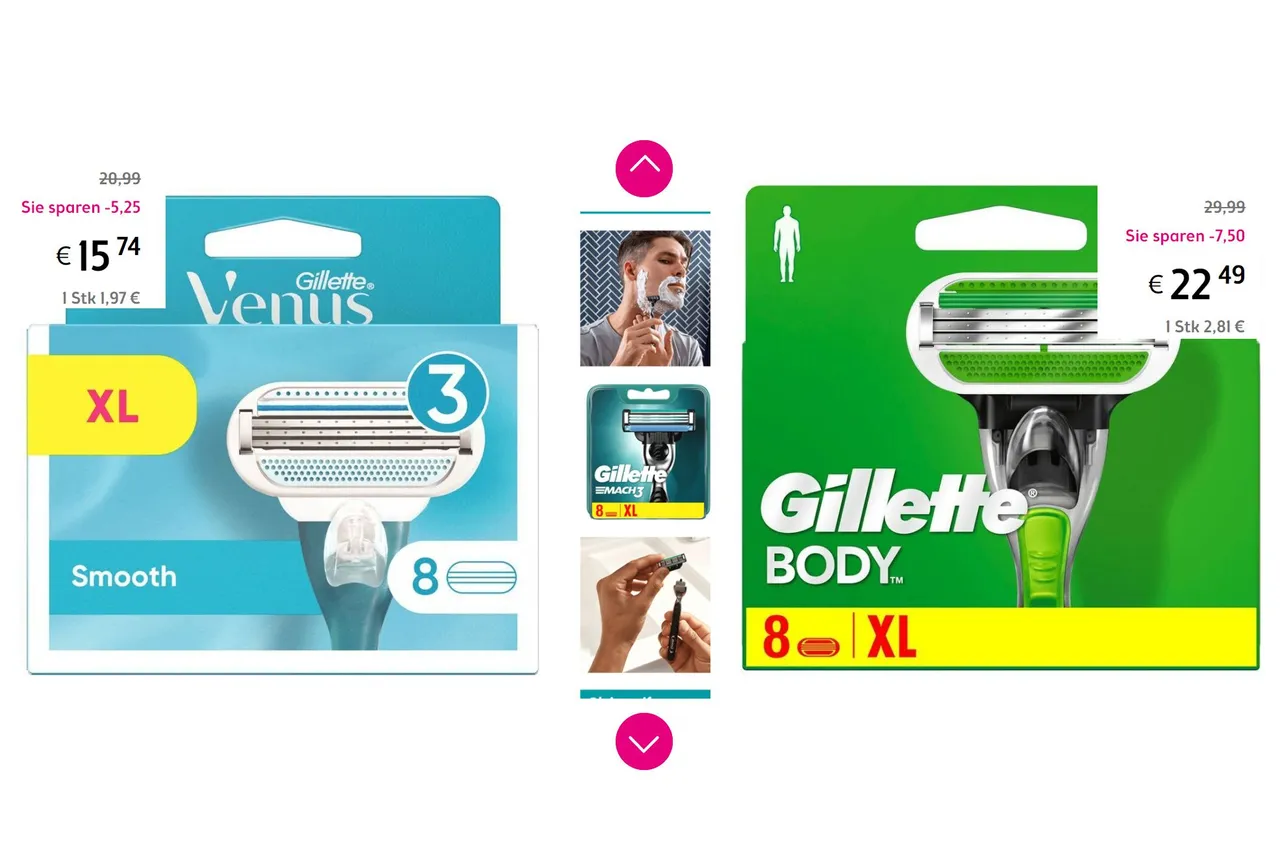Sind qualitative Nassrasierer von Gillette für Frauen wirklich teurer als für Männer?
Im Zusammenhang mit dem Weltfrauentag wird auf die Behauptung aufgestellt, dass Frauen bei manchen geschlechtsspezifischen Produkten diskriminiert werden und mehr für ein gleichwertiges Produkt zahlen müssen als Männer. Stimmt das?
Als Beispiel werden Rasierer angegeben. In diesem Post wollen wir uns diese Produktgruppe anschauen.
Die Behauptung ist, Rasierer für Männer sind billiger und daher werden Frauen ungerechterweise aufgrund ihres Geschlechts diskriminiert. Diese Diskriminierung wird "Pink Tax" genannt und suggeriert, dass Firmen in der EU und den USA absichtlich Produkte für Frauen teurer anbieten als für Männer.
Fakten-Check (Rasierklingen von Gillette)
Bei Bipa gibt es gerade eine Rasierklingen-Aktion von Gillette. Sowohl für Frauen als für Männer.
Frauen
Venus Smooth Klinge (für Frauen)
8 Stück
Normalpreis 20,99
Aktion 15,74
https://www.bipa.at/p/gillette-smooth-klingen/B3-292152.html
Männer
Body Rasierklingen für Männer
8 Stück
Normalpreis 29,99
Aktion 22,49
https://www.bipa.at/p/gillette-body-systemklingen/B3-580170.html
Mach3 Rasierklingen
8 Stück
Normalpreis 19,99
Aktion 14,99
https://www.bipa.at/p/gillette-klingen/B3-434108.html
Fusion 5 ProGlide
8 Stück
Normalpreis 39,99
Aktion 29,99
https://www.bipa.at/p/gillette-5-proglide-klingen/B3-675873.html
Ergebnis
Normalpreis bei Venus-Rasierklingen für Frauen EUR 20,99 vs. Body-Rasierer für Männer 29,99. Mach3 für Männer kommt auf 19,99 bzw. ProGlide auf 39,99 Euro.
Das Männerprodukt ist sogar teurer, allerdings habe ich das Gefühl, dass der Body-Rasierer für Männer nur aus marketingtechnischen Gründen angeboten wird, um der "Pink Tax"-Behauptung Wind aus den Segeln zu nehmen.
Grundsätzlich sind Nassrasierer unisex, können also sowohl von Frauen als auch von Männern verwendet werden, wobei der Markt und das Angebot für "Männer-Rasierer" tatsächlich größer erscheint.
Zumindest bei Gillette kann ich keinen großen preislichen Unterschied zwischen dem Venus-Produkt und dem vergleichbaren Mach3-Produkt erkennen. Mach3 bewegt sich circa auf dem gleichen Preisniveau, während Fusion5-Linie sogar teurer ist.
Insgesamt denke ich, dass es sich hierbei eher nicht um Diskriminierung handelt, sondern eher um Profit-Maximierung, indem Produkte für unterschiedliche Gruppen und Preissegmente angeboten werden. Das hat meiner Meinung nach nichts mit Diskriminierung zu tun.
Wenn Frauen bereit sind für ein pinkes (weißes) Produkt mehr zu bezahlen, weil es besser aussieht, ist das noch nicht Diskriminierung, da sie genauso gut ein Unisex-Produkt kaufen könnten.
Das heißt aber nicht, dass es nicht vielleicht bei anderen Produkten und Dienstleistungen eine Diskriminierung geben könnte. Rasierer sind aber meiner Meinung nach kein gutes Beispiel dafür.
Was meint ihr? Werden Frauen bei Rasierklingen wirklich diskriminiert?

Gillette Venus Razor for women vs. Gillette Body Razor for men. Which one is more expensive? Is there a discrimination against women or men in pricing products?
English
Are quality Gillette wet razors really more expensive for women than for men?
In connection with International Women's Day, the claim is made that women are discriminated against in some gender-specific products and have to pay more for an equivalent product than men. Is this true?
Shavers are given as an example. In this post, let's take a look at this product group.
The claim is, razors for men are cheaper and therefore women are unfairly discriminated against based on their gender. This discrimination is called "pink tax" and suggests that companies are intentionally making products more expensive for women than for men in the U.S. and Europe.
Fact check (Gillette razor blades)
In a drugstore in Austria (Bipa), there is currently a razor blades promotion from Gillette. Both for women and for men.
Women
Venus Smooth blade (for women)
8 pieces
Normal price 20.99
Special offer 15.74
https://www.bipa.at/p/gillette-smooth-klingen/B3-292152.html
Men
Body razor blades for men
8 pieces
Normal price 29.99
Special offer 22.49
https://www.bipa.at/p/gillette-body-systemklingen/B3-580170.html
Mach3 razor blades
8 pieces
Normal price 19.99
Special offer 14.99
https://www.bipa.at/p/gillette-klingen/B3-434108.html
Fusion 5 ProGlide
8 pieces
Normal price 39.99
Special offer 29.99
https://www.bipa.at/p/gillette-5-proglide-klingen/B3-675873.html
Result
Normal price for Venus razor blades for women EUR 20.99 vs. body razor for men 29.99. Mach3 for men comes in at 19.99 or ProGlide at 39.99.
The men's product is even more expensive, however I have a feeling that the body razor for men is only offered for marketing reasons to take the wind out of the sails of the "pink tax" claim.
Basically, wet razors are unisex, so can be used by both women and men, though the market and supply for "men's razors" actually seems larger.
At least with Gillette, I can't see much difference in price between the Venus product and the comparable Mach3 product. Mach3 is at about the same price level, while Fusion5 line is even more expensive.
Overall, I think this is rather not discrimination, but rather profit maximization by offering products for different groups and price segments. In my opinion, this has nothing to do with discrimination.
If women are willing to pay more for a pink (white) product because it looks better, that's not discrimination, since one might as well buy a unisex product.
But that doesn't mean that there might not be discrimination in other products and services. However, razors are not a good example in my opinion.
What do you think? Are women really discriminated against when it comes to razors?
Live your Secrets and Hive Prosper 🍯
xx Viki @vikisecrets